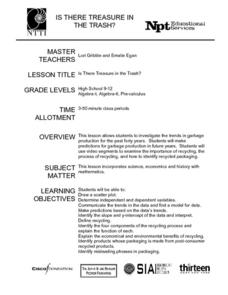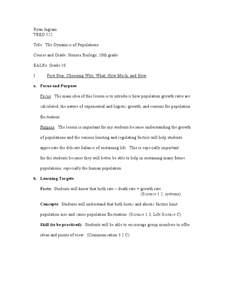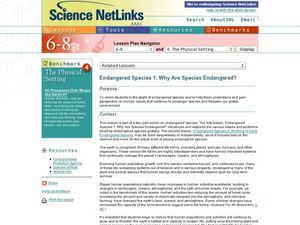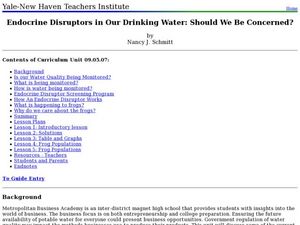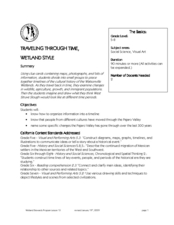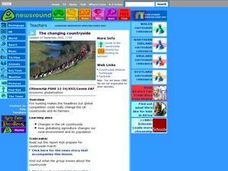Curated OER
Effects of Urban Growth
Learners explore population growth in the United States and the impact it has had on society. First, they brainstorm the reasons for population growth and the results of these increases. Then, they design surveys, record results, and...
Curated OER
Some Similarities Between the Spread of an Infectious Disease and Population Growth
Students compare and contrast the spread of infectious diseases and population growth. For this biology lesson, students identify the exponential growth pattern of spreading diseases. They relate this to HIV infection and AIDS.
Curated OER
A look at our larger population
Student team together to tell the story of the U.S.'s rapid population growth. Young scholars research census changes, focusing on changes in the size of the community and the school. Students tell the story by writing articles and...
Curated OER
Historic Population Chart
Students examine the changes in the population in Idaho over a specific amount of time. In groups, they use the digital atlas to identify the trends in the population and describe why and how they exist. To end the lesson, they compare...
Curated OER
Problem Based Learning Scenario
Students research about the function of MPA's. For this marine science lesson, students explore how humans influence changes near these areas. They explore different MPA's in the Great Lakes region.
Curated OER
Factors Affecting Plant Growth
High schoolers determine the physical and chemical factors that affect plant growth. For this biology lesson, students explain the role of hormones in plants. They investigate how competition with other plants affect their growth.
Curated OER
Is there Treasure in Trash?
More people, more garbage! Young environmentalists graph population growth against the amount of garbage generated per year and find a linear model that best fits the data. This is an older resource that could benefit from more recent...
Curated OER
The Dynamics of Populations
Tenth graders analyze the growth rate of different population. For this biology experiment, 10th graders identify the biotic and abiotic factors that limit population size. They create a poster to show their findings in class.
Curated OER
Endangered Species 1: Why are Species Endangered?
Emerging ecologists examine endangered species by visiting the US Environmental Protection Agency website. They consider human contribution to the decline of different species. They research an endangered animal and then craft a poster...
Curated OER
Changes In Our Community
Ninth graders explore how change and growth affect communities. In this community awareness lesson, 9th graders interview a senior adult. Students research economics and trends in their community.
Curated OER
How Much Is Too Much?
Young scholars examine population growth and collect data. In this statistics instructional activity, students create a scatter plot to represent the different species found in the water and are being harvested. They graph their data and...
Curated OER
Growth in Southern California
Fourth graders examine the impact of orange crops and the railroad industry on the growth in southern California. They develop a fact list about the history of oranges in California, and create a family tree demonstrating the impact of...
Curated OER
Islam in America
Students examine the cultural and religious diversity within the United States. Using the differences, they discover they are a source of growth and change as well as conflict. They identify the changes that occur when new immigrants...
Curated OER
The Impacts of Human Activities on Biodiversity in New Haven County
Students discover how plants and animal ecosystems are affected by the growth of a city. In this ecology lesson, students study and observe a plant over a period of time. They develop a creative presentation of their data and share them...
Curated OER
Endocrine Disruptors in Our Drinking Water: Should We Be Concerned?
Students investigate the different hormone contaminants in the water supply. In this math instructional activity, students analyze data tables and graphs. They demonstrate exponential growth and decay using frog populations.
Curated OER
Traveling Through Time, Wetland Style
Students create a timeline on the development of the Pajaro Valley Area. In this social science lesson, students discuss the changes that took place in the area over the past 300 years. They draw a pictures of how the area has changed...
Curated OER
A Sense of West Virginia
Students consider their perceptions of the world through their 5 senses while visiting the West Virginia State Museum. In this West Virginia history lesson, students discover how knowing about the past helps with their understanding of...
Curated OER
The Changing countryside
Students draw a poster showing the costs and benefits of opening up Britain's farmers to the global marketplace. They use a piece of A4 or A3 paper in landscape. Students draw a vertical line to split the page in two. On the left...
Curated OER
Personal Ecosystem
Students build an aquatic ecosystem using large glass pickle jars. In this ecology lesson, students build and ecosystem then observe and collect data on the habitats. In this long term project students observe a...
Curated OER
Postcards from California: A Unit on Geography, Social Studies, History and California's Resources
Fourth graders examine patterns that influence population density in the various regions of California. The unit's three lessons utilize graphic organizers for the interpretation and presentation of data.
Curated OER
Placing Deerfield in a National Context
Eleventh graders understand that world events brought important changes that impacted Deerfield. Students use information gained from this and other periods to develop a continuum showing the growth of the Deerfield community.
Curated OER
Endangered Species !: Why Are Species Endangered?
Students explore the various issues and problems faced by endangered species globally. They research the plight of endangered species, create a poster of a selected animal, and present their poster and research to the class.
Curated OER
Marine Protected Areas (MPA)
Ninth graders explain the purpose of MPA's. In this biology lesson, 9th graders identify MPA's in Southern California. They simulate coastal sampling using candy from two buckets. Students analyze their results and share it with the class.







